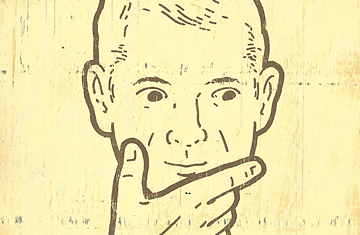
If you want people to use less energy, you could make it very expensive--or you could just let them know how much they use in comparison with their neighbors. When that bit of information was added to electric bills in San Marcos, Calif., heavy users quickly lowered their consumption, even though no one had asked them to. To borrow a term from behavioral economist Richard Thaler and legal scholar Cass Sunstein, the good people of San Marcos had been nudged.
In NUDGE: IMPROVING DECISIONS ABOUT HEALTH, WEALTH, AND HAPPINESS (Yale University Press; 293 pages), the two University of Chicago professors sketch a new approach to public policy that takes into account the odd realities of human behavior, like the deep and unthinking tendency to conform, even in areas--like energy consumption--where conformity is irrelevant. For 30 years, Thaler has documented the ways people act illogically: we eat more from larger plates, care twice as much about losing money as about gaining it, fret over rare events like plane crashes instead of common ones like car accidents. That research underpins Nudge's argument that as policymakers go about their jobs--whether regulating the mortgage industry or organizing food in school cafeterias--they should design programs that give people choices but also invisibly coax them away from bad ones. Putting healthful food at the front of a cafeteria line, for example, leads kids to take more of it, even with nothing to stop them from picking the chips and cookies farther down.
Thaler and Sunstein, longtime colleagues and friends, dub this "libertarian paternalism." The deliberate oxymoron is meant to exalt individual freedom (the authors use their system to explain how one might structure school vouchers or privatize Social Security) while protecting people from cognitive and social forces that lead them to decisions that even they would describe as poor. We are all like houseguests who eat from a bowl of cashews, then thank our host for removing the nuts so that we don't spoil our dinner.
Thaler has been putting these ideas to work for years in corporate retirement-savings plans. Some 30% of people eligible for such plans fail to sign up, even though companies often match contributions--free money, as it were. As a result of Thaler's work, many firms have switched to automatic enrollment. In the language of Nudge, the plans have moved from "opt in" to "opt out." That turns people's inertia-like tendency to stick with the default option--whether or not it's a good one--into an advantage.
The same "choice architecture," as the authors call it, could be used to bolster the nation's ranks of organ donors. In one survey, only 64% of people wishing to be organ donors had marked that choice on their driver's license. If, instead of making people choose to donate, states asked them to check a box if they chose not to, participation rates would skyrocket--from 42% to 82% in one experiment. Even just forcing people to make a decision one way or another (with no default) boosts participation to 79%. More lives saved, and more people following through on a desire to be donors. That's a nudge that can pack a punch.
